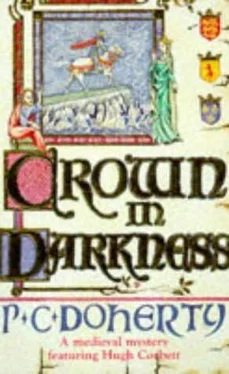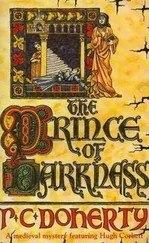Paul Doherty - Crown in Darkness
Здесь есть возможность читать онлайн «Paul Doherty - Crown in Darkness» весь текст электронной книги совершенно бесплатно (целиком полную версию без сокращений). В некоторых случаях можно слушать аудио, скачать через торрент в формате fb2 и присутствует краткое содержание. Жанр: Исторический детектив, на английском языке. Описание произведения, (предисловие) а так же отзывы посетителей доступны на портале библиотеки ЛибКат.
- Название:Crown in Darkness
- Автор:
- Жанр:
- Год:неизвестен
- ISBN:нет данных
- Рейтинг книги:4 / 5. Голосов: 1
-
Избранное:Добавить в избранное
- Отзывы:
-
Ваша оценка:
- 80
- 1
- 2
- 3
- 4
- 5
Crown in Darkness: краткое содержание, описание и аннотация
Предлагаем к чтению аннотацию, описание, краткое содержание или предисловие (зависит от того, что написал сам автор книги «Crown in Darkness»). Если вы не нашли необходимую информацию о книге — напишите в комментариях, мы постараемся отыскать её.
Crown in Darkness — читать онлайн бесплатно полную книгу (весь текст) целиком
Ниже представлен текст книги, разбитый по страницам. Система сохранения места последней прочитанной страницы, позволяет с удобством читать онлайн бесплатно книгу «Crown in Darkness», без необходимости каждый раз заново искать на чём Вы остановились. Поставьте закладку, и сможете в любой момент перейти на страницу, на которой закончили чтение.
Интервал:
Закладка:
Paul Doherty
Crown in Darkness
Introduction
In 1286 King Alexander III left Edinburgh Castle, crossed the Firth of Forth and began a wild ride through a stormy night to Kinghorn Manor where his new bride, the Princess Yolande of France, was waiting for him. Alexander never reached his destination for his horse allegedly slipped, taking both horse and rider on to the cruel rocks below. Alexander's death created a vacuum in Scottish politics. He left no real heir-apparent and the great nobles of Scotland began to jockey for power, each desirous of seizing the throne for themselves. Matters were complicated because the great nation states of Europe, England under Edward I and France under Philip IV, also saw Scotland as an area of influence. Into this maelstrom of politics, intrigue, conspiracy and murder, Robert Burnell, Chancellor of England, sends his faithful clerk, Hugh Corbett, to find out the true reason behind Alexander's death and, if possible, to see if there is any link between Alexander's death and those now desirous of taking the dead king's crown. Corbett is aided by his faithful servant, Ranulf, as he unravels the tortuous mystery in the slums, ruins and dungeons of Edinburgh Castle, the opulence of royal manors and the strange, eerie surroundings of the great Scottish prophet, Thomas the Rhymer, or Thomas of Learmouth. Corbett is threatened, attacked, imprisoned but, faithful to his task, he eventually unravels the fascinating mysterious truth behind the Scottish king's death.
ONE
The rider goaded his horse, digging the rowels of his spurs deeper into the animal's flanks till thin red gashes appeared. The horse, head forward, foam-flecked from nostrils to withers, attempted to move faster, charging the stinging wind as if it was an enemy. It was the darkest, wildest of nights; the wind howled in, almost drowning the clamouring thunder of the waves beneath the cliff but the rider did not care about the elements or that he had apparently left his companions behind. The moon slid between the clouds and the rider turned his head against a particularly savage blast. He thought he saw shadows move there, further back across the cliff, but then dismissed them as phantasms, the product of too much rich food and blood-red Gascon wine. No, he had to reach Kinghorn where Yolande was waiting. He thought of his new French Queen. The beautiful face of a Helen of Troy framed by hair jet-black as the deepest night, olive, perfumed skin and a small curvaceous figure clothed and protected in a profusion of satins, velvets and Bruges lace. He wanted her now; to possess that soft warm body, ripping aside the protests and the pretences. Perhaps she would conceive, bear a son, give Scotland a Prince. A vigorous boy to wear the crown and protect it against the ring of wolves and falcons both at home and abroad. He must reach Kinghorn and scarred his horse angrily with his spurs. The animal, its brave heart near to bursting, gave its best, almost flinging itself forward along the cliffs edge. Suddenly it stumbled, tipping sideways, and crumpled to its knees amongst the loose shale. The rider, flung up against the dark sky, fell through the night, his fingers clawing the air as he plunged down to the waiting rocks.
'Hugh Corbett, Clerk, to Robert Burnell, Bishop of Bath and Wells and Chancellor of England, greetings. My escort and I have now arrived at Edinburgh, secure in both body and soul, though still exhausted after a wearying journey.' Corbett put the sharp quilled pen down and rubbed the ache in his thighs. It had been, he thought, a terrible journey. He and a small escort had left London at the end of March and travelled by horseback through Newark, Lincoln, Newcastle, Tynemouth and Berwick. The cold had been biting, knife-edged eastern winds, flea-ridden ale-houses with only the occasional luxurious break in a comfortable priory or monastery where he could bathe the saddle-sores on his backside and thighs. His body-servant, Ranulf, had become ill and was left at Tynemouth Priory, and there had been other dangers. Corbett turned back to his letter. 'It may interest your Lordship to know that the legislation enacted last year at the Parliament held at Winchester needs to be enforced. Roads and highways have not been cleared a hundred yards back and twice we were attacked by outlaws. Once outside Newark and again near Tynemouth, by crude fellows with crossbows, mallets and rusty daggers, but we beat, them off.' Corbett realised he was understating the incidents: the countryside was plagued by gangs of landless, desperate men. God knows, he, a clerk to the Justices of the King's Bench, had seen such men tried and hanged, twirling by their necks, legs kicking, tongues out, their blackening faces and protruding eyes sufficient warning to any others who tried to break the King's peace. Especially, Corbett thought, after the new measures to enforce law and order brought in by King Edward at the Winchester Parliament of 1285. Edward I of England had now been on the throne for thirteen years and was still eager to enforce his authority in every nook and cranny of his kingdom. Two years earlier, he and his cunning old Chancellor, Robert Burnell, had used Corbett to root out rebellion, treason and murder in London. Corbett, helped by his servant, Ranulf, was successful but the venture had cost him dear. Edward I and his Chancellor, Burnell, were hard taskmasters and had not flinched from sending the woman Corbett loved to a savage death in the fires of Smithfield. Corbett sighed and continued his letter. 'We crossed the Scottish border without incident except for a troop of men wearing the livery of the Lord Bruce, who stopped us and examined our warrants before letting us continue into Edinburgh.'
Corbett broke off to sharpen the quill. Scotland! The men he had met were tough border-raiders dressed in rags but well-armed with steel helmets, boiled-leather jerkins, leggings and stout boots in the stirrups of small but sturdy-looking garrons or mountain ponies. They each carried a shield, lance and dagger, and seemed eager to use them. Corbett suspected that they would have preferred to cut his throat. He did not understand their strange, rough language, though their leader, a smooth-shaven young man with eyes as hard as flint, understood French and carefully studied the letters and writs Corbett and his escort carried, before allowing them to pass into his strange, wildly beautiful country.
The north of England had been a new experience to Corbett who had served in Edward's armies in France and Wales, but Scotland was something different. Quieter, more lonely, beautiful yet menacing. He had observed it carefully as he travelled into Edinburgh. Vast forests of pine, dark and forbidding, where boar and wolf ruled; wide wastes of lonely, haunting moor, bogs, mountains and lakes covered the land. In England, the old Roman highways, sometimes much broken but their foundations still solid, spread out from London to form the main routes for travel. In Scotland, apart from the King's Highway, the Via Regis, there were few roads, only beaten tracks. Corbett had found it difficult to reach the royal burgh of Edinburgh and, when he did, bitterly wondered if it had been worth the effort. Perched on its craggy plateau, its grim fortress a mile separate from the abbey of Holy Rood, Edinburgh had been cold, dank and uninviting. Corbett and his escort had gone direct to the castle to present their credentials and were brusquely sent back to be housed in the cold, bleak, whitewashed cells of the abbey's guesthouse.
He had wasted two days before writing this letter and was reluctant to continue it for, after seven weeks of travel, he still had little news for his master. He had met the leader of King Edward's special embassy to the Scottish court, John Benstede, chaplain to Edward I, who had extended to Corbett the warmest of greetings. Corbett had liked him; he knew Benstede by reputation as a cleric fanatically loyal to Kind Edward who entrusted him with the most delicate, diplomatic missions. Benstede had a keen lawyer's brain, belied by his rosy, cherubic face, snow-white hair and rubicund figure. Thankfully, he had accepted without question Corbett's explanation that Burnell had sent him because of the crisis at the Scottish court.
Читать дальшеИнтервал:
Закладка:
Похожие книги на «Crown in Darkness»
Представляем Вашему вниманию похожие книги на «Crown in Darkness» списком для выбора. Мы отобрали схожую по названию и смыслу литературу в надежде предоставить читателям больше вариантов отыскать новые, интересные, ещё непрочитанные произведения.
Обсуждение, отзывы о книге «Crown in Darkness» и просто собственные мнения читателей. Оставьте ваши комментарии, напишите, что Вы думаете о произведении, его смысле или главных героях. Укажите что конкретно понравилось, а что нет, и почему Вы так считаете.












